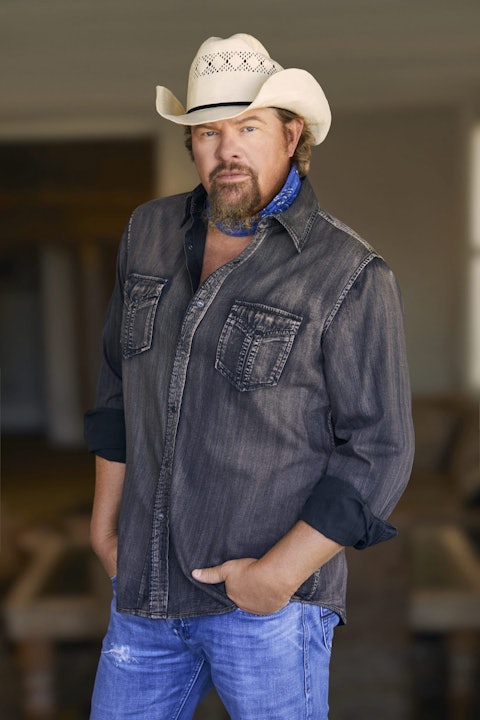Toby
Keith

-
Inducted2024
-
Born
July 8, 1961
-
Died
February 5, 2024
-
Birthplace
Clinton, Oklahoma
With a commanding baritone, brash persona, and a gift for clever songcraft, Toby Keith helped set the tone for country music in the twenty-first century. He found a distinct style with good-humored, boisterous hits such as “How Do You Like Me Now?!” and “I Wanna Talk About Me” as well as songs that spoke to the resolve of the American people.
From Oil Rigs to Dance Halls
Toby Keith Covel was born on July 8, 1961, in Clinton, Oklahoma, to Hubert K. Covel Jr., a derrick hand on oil rigs, and Joan Covel, an aspiring singer-turned-homemaker. Keith received his first guitar at age eight and spent formative summers working at his grandmother’s tavern in Arkansas, occasionally sitting in with the house band.
Keith turned out to be a young man of many talents. After working as a rodeo hand in high school, he followed his father working in the oil fields and later played semi-professional football for the Oklahoma City Drillers.
At age twenty, he began fronting the Easy Money Band and spent much of the 1980s building a following on the Texas-Oklahoma dance hall circuit performing country and rock covers. Along with his powerful voice, Keith had a talent for songwriting that soon became evident: his future 1996 hit “Does That Blue Moon Ever Shine on You” was among the original songs his band performed and recorded.
Towards the end of the decade, Keith trained his sights on Music Row, making regular visits to Nashville to shop his demo tapes of original songs. A fan from the dance halls made the connection leading to his big break. Producer and Mercury Records executive Harold Shedd was given one of Keith’s tapes by the fan, a flight attendant. Within days, Shedd flew to Oklahoma to see Keith perform and immediately offered him a contract.
00:00 / 00:00
00:00 / 00:00
00:00 / 00:00
A Star Is Born
Keith’s self-titled debut album arrived in 1993, with its leadoff single “Should’ve Been a Cowboy” becoming his first #1 country hit. Like most of the songs on the album, “Cowboy“ was written solely by Keith. Over the next five years, he’d enjoy ten Top Five country hits—many of them self-penned—including the chart-toppers “Who’s That Man,” “Me Too,” and “I’m So Happy I Can’t Stop Crying,” a duet with Sting.
Keith’s success was consistent, but his place under the Mercury Records umbrella was not. After being shuffled across the label’s subsidiaries—and having ongoing disagreements about the music he wanted to release—Keith parted with Mercury and signed to DreamWorks Nashville.
His next album, 1999’s How Do You Like Me Now?! marked the arrival of the brash image that would come to define Keith in the public eye. Its title track—which topped Billboard’s year-end Hot Country Songs chart in 2000—found him getting the last laugh on a woman who spurned him, but it easily could have been aimed at the decision-makers who’d previously stood in his way.
He struck similar creative gold with 2001’s chart-topper “I Wanna Talk About Me.” Penned by Country Music Hall of Fame songwriter Bobby Braddock, the rap-inspired hit had Keith fighting to get a word in with his significant other. By year’s end, however, Keith’s songs began speaking up for more people than just himself.
-
 Toby Keith publicity photo, 1992. Photo by David Michael Kennedy.
Toby Keith publicity photo, 1992. Photo by David Michael Kennedy. -
 Toby Keith accepting flowers from a young fan, 1993.
Toby Keith accepting flowers from a young fan, 1993. -
 Toby Keith, 1990s.
Toby Keith, 1990s. -
 From left: Keith Mellington, Johnie Helms and Chris Troup of the Easy Money Band, Toby Keith and David Vowell, Mike Crossno, Chuck Goff and Scott Webb of the Easy Money Band celebrating Keith's self-titled album reaching gold, 1994. Photo by Dan Loftin.
From left: Keith Mellington, Johnie Helms and Chris Troup of the Easy Money Band, Toby Keith and David Vowell, Mike Crossno, Chuck Goff and Scott Webb of the Easy Money Band celebrating Keith's self-titled album reaching gold, 1994. Photo by Dan Loftin. -
 Toby Keith, 1999.
Toby Keith, 1999. -
 Toby Keith donning a U.S. Navy Blue Angels "V.I.P." flight suit, 1990s.
Toby Keith donning a U.S. Navy Blue Angels "V.I.P." flight suit, 1990s. -
 Toby Keith performing at Fan Fair, 1999.
Toby Keith performing at Fan Fair, 1999. -
 Toby Keith and wife Tricia Covel at the 2001 BMI Country Awads.
Toby Keith and wife Tricia Covel at the 2001 BMI Country Awads. -
 Toby Keith on set with Willie Nelson, 2000s.
Toby Keith on set with Willie Nelson, 2000s. -
 Toby Keith, 2021. Photo by Richard McLaren.
Toby Keith, 2021. Photo by Richard McLaren.
A Controversial Anthem
In the wake of the September 11 terrorist attacks—and the recent death of his father, an army veteran—Keith wrote “Courtesy of the Red, White and Blue (The Angry American)” in twenty minutes. In it, he called for payback on those who had struck America. Originally he performed the song exclusively for servicemen and women, but he was urged by that audience to record and release it.
It rocketed to #1 in July 2002. As he had expected, the song caused immediate controversy. According to Keith, its lyrics sparked a disagreement that caused him to back out of a network television special. Among the song’s prominent detractors was Natalie Maines of the Dixie Chicks, who criticized the song in a newspaper interview, touching off a brief media feud.
However, the song was embraced by many, and it forged a lasting bond between Keith and the U.S. military. He went on multiple USO tours over the course of two decades, doing nearly 300 shows for more than 250,000 service members. His experience inspired songs such as “American Soldier,” a heartfelt tribute which topped the country chart in 2004.
At the same time, Keith continued to record freewheeling, wisecracking hits. Willie Nelson joined him in calling for justice against criminality and corruption on “Beer for My Horses” (2002). He humorously owned up to the mortifications of aging in “As Good as I Once Was” (2005), and he sang the praises of a watering hole that brought all kinds together on “I Love This Bar” (2003).
In the wake of the September 11 terrorist attacks—and the recent death of his father, an army veteran—Keith wrote “Courtesy of the Red, White and Blue (The Angry American)” in twenty minutes.
Building a Country Empire
The latter song’s success led to the creation of Toby Keith’s I Love This Bar & Grill, which boasted nearly two dozen locations across the country at its peak in the 2010s. Its success, coupled with his Wild Shot mezcal brand, led Forbes to dub Keith “country’s $500 million man.”
Another key business move came in 2005, when Keith founded his own label for his music, Show Dog Nashville. In the process, he also purchased what turned out to be a highly lucrative stake in the fledgling Big Machine Records label—which would soon launch the career of Taylor Swift.
At the helm of Show Dog, Keith had no problem maintaining his status on the charts. He racked up twenty-two more Top Twenty country hits over the next nine years, and he claimed the last of twenty career #1s on the Billboard charts with 2011’s “Made in America.” The subsequent single “Red Solo Cup,” however, became the biggest crossover success of his career, reaching #15 on Billboard’s Hot 100 on its way to becoming a tailgate anthem.
In 2021, Keith was diagnosed with stomach cancer and made the news public the following year as he canceled his scheduled shows. He’d been close to those who battled the disease since at least 2006, when his Toby Keith Foundation began providing no-cost housing to pediatric cancer patients in Oklahoma, culminating in the opening of his full-service lodge for those patients and their families, the OK Kids Korral, in Oklahoma City, in late 2013.
Keith returned to the stage in 2023 and gave a breathtaking final televised performance on The People’s Choice Country Awards. Keith sang “Don’t Let the Old Man In”—a song he wrote years earlier for a Clint Eastwood film, now imbued with tear-welling relevance. “Don’t let the old man in,” Keith sang. “I wanna live me some more.”
He died February 5, 2024, at age sixty-two. Three days before his passing, voting concluded for the 2024 inductees into the Country Music Hall of Fame, and Keith was deservedly elected in the Modern Era Artist category.
—Dave Paulson
Videos
“A Little Too Late”
“I Love This Bar”



